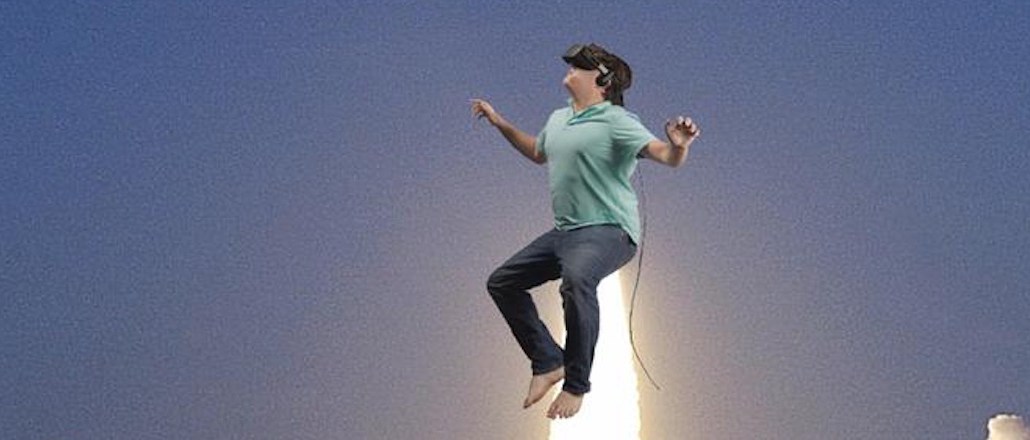
Time Magazine probably wishes it lived in alternate universe right about now. Yesterday, the newsweekly revealed its latest cover showing Oculus founder Palmer Luckey wearing his virtual reality mask, leaping on some beach for some inexplicable reason. He’s also barefoot? The online version of the cover is animated and, well, it’s strange!
TIME’s new cover: Virtual Reality. Why it’s about to change the world https://t.co/1nbXSsF36w
— TIME.com (@TIME) August 6, 2015
The peculiar cover certainly did its job of getting the Internet to notice. The profile of Luckey, who sold his company to Facebook last year for a cool $2 billion, starts off just as awkwardly by stating that “Luckey isn’t like other Silicon Valley nerds” — reinforcing a stereotype that would make the #ILookLikeAnEngineer creator shaking her head.
And it wasn’t long until social media reacted to the cover with people tweeting memes and mashups that almost rivaled the iconic “New York Times Magazine” cover where Hillary Clinton was a moon.
The Daily Dot spearheaded the effort by tweeting out a picture of Luckey for followers to use. “The worse you are at Photoshop, the better,” they said before being being at the receiving end offensive mashups that can be seen toward the bottom of the thread. Time realized how ridiculous the cover and aggregated 37 of its favorite memes, too.
Not everyone hated it, though. Richard Turley, creator of some of his generation’s most iconic magazine covers during his time as Bloomberg Businessweek magazine creative director, told Digiday that he thinks that the weirder, the better.
“I support Time magazine’s futurology and its embrace of alternate three-dimensional conceptual parallel universes (digital or otherwise),” said Turley, who is now MTV’s Senior Vice President of Visual Storytelling. “Let the psychonauts free. Who’s to say what’s real anymore, anyway.”
The psychonauts certainly had their field day. Here’s a look at some of the better cover memes:
Hey, @Time. You know what would have been better for your VR cover? LITERALLY ANYTHING ELSE pic.twitter.com/6mbZ76BkUS — CasealUnit (@RevolverUnit) August 6, 2015
My contribution to the Palmer Luckey cover madness pic.twitter.com/ohRKTIPvHp — Andrew Freedman (@Andrew_Freedman) August 6, 2015
We are just getting started…. CC @hmltn @oculus @PalmerLuckey @TIME pic.twitter.com/JV5QRRYSrZ — Robert McGregor (@ID_R_McGregor) August 6, 2015
@dailydot @TIME pic.twitter.com/n8Iqb8vEM7 — Danny Espinoza (@dannyjespinoza) August 6, 2015
@dailydot @TIME Hey y’all. pic.twitter.com/WYFlhYf4Xb — Monica Riese (@monicariese) August 6, 2015
@dailydot @TIME pic.twitter.com/vjaXC5xSdW — @jeremycabo (@jeremycabo) August 6, 2015
@therealcliffyb Couldn’t resist. ;) pic.twitter.com/4NQKsHyYT7
— Sean Pelletier (@PellyNV) August 6, 2015
I decided to photoshop @Time‘s VR cover image too. Into nightmares. #waterlevel pic.twitter.com/mUvPEqLZJ2 — Janelle Bonanno (@s0osleepie) August 6, 2015
.@TIME I got a cover for ya pic.twitter.com/doFAmZdj7o
— Matt Ufford (@mattufford) August 6, 2015
More in Media

In Graphic Detail: The scale of the challenge facing publishers, politicians eager to damage Google’s adland dominance
Last year was a blowout ad revenue year for Google, despite challenges from several quarters.

Why Walmart is basically a tech company now
The retail giant joined the Nasdaq exchange, also home to technology companies like Amazon, in December.

The Athletic invests in live blogs, video to insulate sports coverage from AI scraping
As the Super Bowl and Winter Olympics collide, The Athletic is leaning into live blogs and video to keeps fans locked in, and AI bots at bay.





